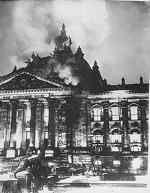| « Justice, Law, and the Struggle for Change | Wisconsin's Spirit: Courage for Other States to Emulate » |
Fascism Wisconsin Style - Troopers Target Legislators Homes
By Jonathryn posted by Michael Collins

Special Emergency Powers Legislation
The news from Wisconsin today is that Wisconsin State Troopers, under the direction of a political appointee of the Governor, are visiting the homes of legislators who are resisting the Governor’s deeply unpopular legislation. By what reckoning can an executive, using armed men in state uniforms, dictate a legislator’s prerogatives, or the prerogatives of a caucus of legislators? If you chose “brute force,” you answered correctly.
The extremely dubious provocation of sending State Troopers to legislators’ homes gives the impression that what the legislators are doing is illegal. It’s not. And by attempting to refocus the media on where the legislators live with their families and children, instead of the huge mass demonstrations at the capitol, it seeks to exert not only official, state-sanctioned physical intimidation of those legislators in the places where their spouses and children live. By bringing the legislators’ homes into the discussion it invites unofficial state-sanctioned violence in the form of people like Jared Lee Loughner, the man who brought a gun to a political event and injured fourteen people, including sitting congresswoman Gabreielle Giffords, and killed six others, including Chief U.S. District Court Judge John Roll.
“Oh no,” one might say, “we can’t know that Walker would even consider violence against his political opposition.” Well, actually, we do know that. In a telephone conversation with someone who identified himself as Conservative billionaire and campaign finacier David Koch, the ersatz Koch suggested using agents provocateur against the protesters in the state capitol, to create the false impression that State Troopers were necessary to storm the capitol, to which Walker replied that you know, well, they had thought of that, but there was just one problem: “You know, well, the only problem with that — because we thought about that. . . . My only fear would be if there’s a ruckus caused is that would scare the public into thinking maybe the governor has to settle to avoid all these problems.”
Yes, how DOES one get peasant’s blood off the carpet? “All these problems” are ever so bothersome.
Apparently, the only thing holding them back is not whether the men, women, and children exercising their first amendment rights to assemble and speak freely would be shot, clubbed, gassed, electrocuted with tasers; but that the optics of State Troopers storming the people’s capitol and clubbing children would be impolitic: "You know, well, the only problem . . . would be if there’s a ruckus caused is that would scare the public into thinking maybe the governor has to settle to avoid all these problems.”
And after all, what would be his disposition toward a dead or maimed opposition politician, if his attitude could be summed up as “what are a few dead peasants more or less?”
Any political operation that rounds up opposition legislators, props them at their seats, and forces them to vote at gunpoint in a Potemkin sham of a republican form of government, should be called what it is: fascist. Opposition legislators who would allow themselves to be so used, to create legitimacy in what would otherwise be rightly recognized as the farce it is, like stage props in a fore-ordained “legal proceeding” as legitimate as Saddam Hussein’s unanimous and unopposed election as President of Iraq.
William Shirer, a press correspondent in the 1930s, watched similar manipulations surrounding groundbreaking legislation called the Enabling Act (“Law for Removing the Distress of People and Government”):
The plan was deceptively simple and had the advantage of cloaking the seizure of absolute power in legality. The Reichstag would be asked to pass an “enabling act” conferring on Hitler’s cabinet exclusive legislative powers for four years. . . . How to obtain that majority was the main order of business at a cabinet meeting on March 15, 1934, the minutes of which were produced at Nuremberg. Part of the problem would be solved by the “absence” of the eighty-one Communist members of the Reichstag. Goering felt sure that the rest of the problem could be easily disposed of by “refusing admittance to a few Social Democrats.” . . . Yet one of them, Otto Wells, leader of the Social Democrats, a dozen of whose deputies had been “detained” by the police, rose,--amid the roar of the storm troopers outside yelling, “Full powers, or else!”—to defy the would-be dictator. Speaking quietly and with great dignity, Wells declared that the government might strip the Socialists of their power but it could never strip them of their honor.
The vote was held in the Opera House. The Special Emergency Powers Hitler was requesting was because he had directed the head of state security, Hermann Goerring, to burn down the parliamentary building, the Reichstag. Hitler was essentially forcing legislation to address a problem he himself had created.
First published in The Agonist


